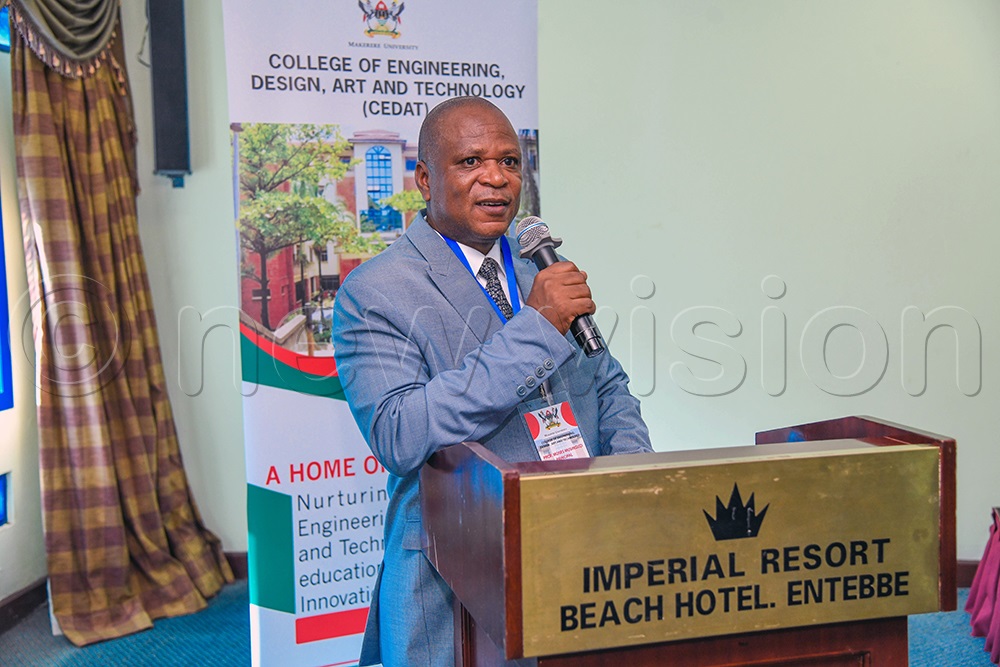Innovation experts rally Makerere to bridge Uganda's tech gap
At a strategic meeting held on Monday, April 14, 2025, at the Imperial Resort Beach Hotel in Entebbe, experts and academics gathered to discuss the role of CEDAT in fostering Uganda’s innovation and technological development.
Prof. Eriya Hisali, a lecturer at the School of Economics, College of Business and Management Sciences, Makerere University, emphasised the potential for CEDAT to align its curriculum with Uganda’s innovation and development agenda. (Photo by John Odyek)
John Odyek
Journalist @New Vision
__________________
Experts and academics have urged Makerere University’s College of Engineering, Design, Art and Technology (CEDAT) to reassess and refine its teaching and research strategies to better contribute to the country’s socio-economic transformation.
At a strategic meeting held on Monday, April 14, 2025, at the Imperial Resort Beach Hotel in Entebbe, experts and academics gathered to discuss the role of CEDAT in fostering Uganda’s innovation and technological development.
Prof. Eriya Hisali, a lecturer at the School of Economics, College of Business and Management Sciences, Makerere University, emphasised the potential for CEDAT to align its curriculum with Uganda’s innovation and development agenda.
He said CEDAT could play a significant role in addressing the regulatory challenges that hinder technological progress. By examining the technological gaps within Uganda, he noted, informed solutions can be crafted to propel the country toward sustainable growth.
Prof. Henry Alinaitwe, a lecturer at Makerere University’s College of Engineering, Design, Art and Technology. (Photo by John Odyek)
Hisali cautioned against relying on short-term technological fixes, such as the heavy importation of goods, which he said can obscure the true scale of the nation’s challenges. He stressed that technological innovation must be driven by scientific processes and tailored to solving real-life societal issues. He warned against using intuition as a basis for innovation.
Tackling Uganda’s technological deficit
Uganda ranked 119th out of 132 countries in the 2022 Global Innovation Index, illustrating the nation’s struggles with technological advancement. “Uganda is lagging behind, particularly in protecting and commercialising research,” Hisali said.
He argued that genuine technological development requires a robust regulatory framework and a national conversation around its implementation.
A call for policy change and support
Hisali urged a shift in how innovation is approached in Uganda. “We are sitting on a sea of problems, but are failing to address them,” he said, while representing Makerere University Vice Chancellor Prof. Barnabas Nawangwe. “We need to support those who go into innovation and technology, and policies must be examined to ensure they align with the future we envision.”
Makerere’s vision for the future
Prof. Buyinza Mukadasi, acting Deputy Vice Chancellor in charge of academic affairs at Makerere University, emphasised the importance of moving beyond research generation to producing practical, impactful outcomes.

Prof. Buyinza Mukadasi, the acting deputy vice chancellor in charge of academic affairs at Makerere University. (Photo by John Odyek)
“Our research needs to transcend theory and deliver real-world solutions that can change lives,” Mukadasi explained.
He introduced the "University 5.0" concept, which envisions a future where universities evolve into hubs of innovation, knowledge exchange, and social impact. The new model prioritises integration of technology, artificial intelligence, big data, and industrial partnerships to ensure that academic programmes are aligned with workforce needs.
“CEDAT is at the heart of this transformation,” Mukadasi added, praising the college’s potential to lead the charge in innovation.
Bridging gap between theory and practice
Dr Anthony Gidudu, Dean of the School of the Built Environment at CEDAT, noted that while Ugandan engineering students excel in theory, they often struggle to apply their knowledge practically. Gidudu called for an industry-aligned curriculum that better prepares students for professional environments.
“We need to foster entrepreneurial thinking among students and align their training with real-world demands,” Gidudu said.
He emphasised the role of innovation in driving economic transformation, observing that Uganda’s current ecosystem lacks large state-owned enterprises, like those in China, which are critical for widespread employment and innovation.
The challenge of sustainability
Prof. Umar Bagampadde, a lecturer at CEDAT, pointed out that while Uganda has many small successful businesses, their long-term survival is often uncertain.
“In China, large corporations are supported over the long term, but in Uganda, there’s no clear policy or institutional framework to ensure the sustainability of small and medium-sized enterprises,” Bagampadde explained.
Addressing the funding crisis
Prof. Moses Musinguzi, principal of CEDAT, identified funding as a major obstacle to innovation development in Uganda.

Prof. Moses Musinguzi urged Makerere University’s College of Engineering, Design, Art, and Technology. (Photo by John Odyek)
“While many institutions have well-written strategic plans, there is a lack of evaluation and follow-up, which prevents meaningful progress,” he said. Musinguzi called for more effective plan evaluations to address key challenges and leverage technology to improve societal welfare.
Creating a lasting impact
Musinguzi also stressed the importance of creating a memorable learning experience for students, akin to the lasting memories they have of their halls of residence.
He said CEDAT must foster an environment that leaves a long-lasting impression on its students and that alumni can significantly contribute to the college’s growth. Alma mater refers to the university, school, or college that one formerly attended.
Prof. Henry Alinaitwe, a lecturer at CEDAT, shared that during his time as a student in Australia, he observed Chinese students frequently photographing various things, which they later replicated upon returning to China.